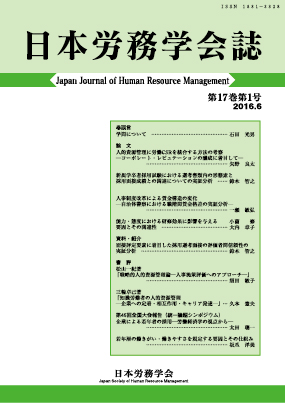Volume 16, Issue 2
Displaying 1-9 of 9 articles from this issue
- |<
- <
- 1
- >
- >|
Foreword
-
2015 Volume 16 Issue 2 Pages 2-3
Published: December 01, 2015
Released on J-STAGE: April 13, 2023
Download PDF (1148K)
Articles
-
2015 Volume 16 Issue 2 Pages 4-19
Published: December 01, 2015
Released on J-STAGE: April 13, 2023
Download PDF (1658K) -
2015 Volume 16 Issue 2 Pages 20-35
Published: December 01, 2015
Released on J-STAGE: April 13, 2023
Download PDF (1398K) -
2015 Volume 16 Issue 2 Pages 36-59
Published: December 01, 2015
Released on J-STAGE: April 13, 2023
Download PDF (1915K)
Research Notes & Documents
-
2015 Volume 16 Issue 2 Pages 60-78
Published: December 01, 2015
Released on J-STAGE: April 13, 2023
Download PDF (1588K)
Book Review
-
2015 Volume 16 Issue 2 Pages 79-81
Published: December 01, 2015
Released on J-STAGE: April 13, 2023
Download PDF (1179K) -
2015 Volume 16 Issue 2 Pages 82-85
Published: December 01, 2015
Released on J-STAGE: April 13, 2023
Download PDF (1139K)
The 44th Annual Conference at Hokkai Gakuen University
-
2015 Volume 16 Issue 2 Pages 90-99
Published: December 01, 2015
Released on J-STAGE: April 13, 2023
Download PDF (1378K) -
2015 Volume 16 Issue 2 Pages 100-111
Published: December 01, 2015
Released on J-STAGE: April 13, 2023
Download PDF (1459K)
- |<
- <
- 1
- >
- >|
